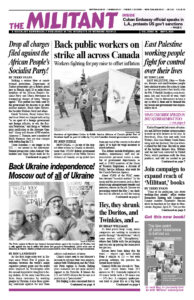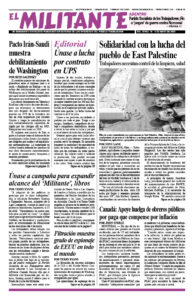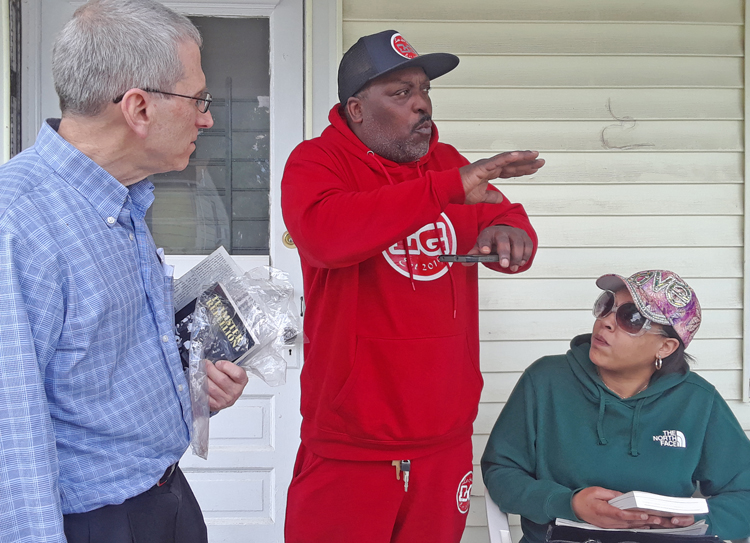EAST PALESTINE, Ohio — Workers, farmers and small-business people here continue to press for action to clean up the area and protect their health after the Feb. 3 Norfolk Southern train derailment, fire and burn-off of toxic vinyl chloride. They’re determined to have a say in what is done and to demand the rail bosses and government bear responsibility for it.
Kathie Fitzgerald led a team of unionists and Militant worker-correspondents to meet up with farmers in the area. In Petersburg, Ohio, they met with Trish Withers, who runs Honey Creek Farms along with her husband. She also drives a school bus full time. She told us some of the barriers farmers face. Withers said she had been contacted by United Dairy, which purchases milk the farm produces, and told she needed to get tests on her milk for a list of chemicals that cost about $175 each. Luckily, she said, the company called when her veterinarian was there so she put him on the phone and he told United the animals were fine.
Fitzgerald said the Militant had reported on a similar derailment involving vinyl chloride in Paulsboro, New Jersey, 11 years ago (see accompanying article) and the lack of action and follow-up by the railroad and government afterward. “I’d heard about that too,” said Withers.
“What’s different here,” said Fitzgerald, “is that working people in this area, along with the rail unions, have raised hell about the issues resulting from the derailment. One result is the railroad had to clean up the contaminated soil under both sets of tracks, something they had no intention of doing.”
Withers said she has friends who work on the railroad and they told her how Norfolk Southern tried to ship the contaminated soil out of state without telling the people who live where it was sent.
“When the trains come through it shuts the town down,” she said. “That’s the concern of the railroads,” Fitzgerald responded, “getting the trains running to make money, not our welfare. Look at what they’ve done to their own workers — cut the workforce by 30%, cut maintenance of the tracks and cars, lengthened the trains and pushed for smaller crews. That’s why the rail unions voted to strike, but they were blocked by President Biden and Congress.”
In nearby Darlington, Pennsylvania, Fitzgerald met up with Bill Hawkins, a member of the International Brotherhood of Electrical Workers, to talk to him about the Militant. He was interested in the rallies being held by Teamsters as UPS contract negotiations begin. She showed Hawkins the letter Teamsters Local 70 in Alameda, California, sent to Ohio Gov. Michael DeWine and Norfolk Southern bosses expressing its solidarity with the efforts of the Brotherhood of Maintenance of Way Employees to win changes in dangerous Norfolk Southern policies. Hawkins liked that. “I’m going to show this to my local president,” he said.
Since the derailment there has been a drop-off in participation from schools outside the city in sporting events hosted in East Palestine. “Historically, we host four large invitationals here each year. They’re a big deal. We typically have between 20 and 30 schools,” Athletic Director Dwayne Pavkovich told WTAE-TV. “This year our largest has been 13. We’re having a meet on Saturday, where last year we had 22. We have 7.”
Gov’t tells people ‘don’t worry’
Environmental Protection Agency Response Coordinator Mark Durno held a meeting with East Palestine residents April 20 to discuss their concerns that dangerous dioxins were created by the fire and burn-off after the derailment. He told them the answer was yes, they found dioxins, but the levels detected weren’t large enough to cause any alarm. Salem News reported people at the meeting pushed back at his assurances, with one person pointing out that if a campfire creates low-level dioxins, it isn’t a stretch to assume the controlled burn of 1.1 million pounds of vinyl chloride, like happened here, would lead to a substantial problem.
Others voiced concern over the results of private medical tests they had taken that show high levels of vinyl chloride in their urine.
After Durno claimed there were no longer any problems in area waterways, people told him there were still chemicals in the creeks. Durno changed his tune, telling them to “stay clear of the creeks until further notice.” He didn’t say what would be done about it.
This is what has marked the past two months — the insistence of working people here on having some control over what happens and to protect their lives and homes in the future.
Norfolk Southern CEO Alan Shaw told an Ohio Senate panel April 18 that he supports Congressional efforts to pass new railway safety regulations, but added that there is no data supporting the rail union’s insistence that two-person crews help prevent derailments..
Fight over rail crew size
Rail workers and their unions are fighting to keep at least two-person crews on the engine, an engineer and a conductor, against demands by the rail bosses to cut that to just an engineer. The bosses say new technology — like detectors set up on the tracks to catch overheating on axle bearings — take the place of the conductor. But on the East Palestine line, Norfolk Southern had set the detectors way too high, and no warning was sent to the crew until it was too late to prevent the derailment.
An April 17 New York Times article, “Texas to New Jersey: Tracking the Toxic Chemicals in the Ohio Train Inferno,” explains how the railroads have moved to take a greater role in transporting these products. As coal shipments have fallen by almost half over the past decade, the Times reports, rail bosses have looked for alternative sources of business and profit, and these chemicals — like vinyl chloride, which is widely used in PVC pipes and other plastics — has risen by about a third over the past decade.
The tank cars of vinyl chloride that derailed and released the toxic chemical in both East Palestine and Paulsboro had originated in an Occidental Petroleum plant in Texas and were on their way to a plastics factory in New Jersey.
This underscores the stakes for working people and our unions — in city and countryside, alongside rail tracks and in the communities surrounding plants processing hazardous materials — in fighting together alongside rail and other workers for control over production and transportation.
This includes rail workers winning the fight to limit train length to 50 cars staffed with a full crew of four, two on the front end and two on the rear.
One person was killed and nearly 100 sickened after a fungal outbreak at the 830-worker Billerud paper mill in Escanaba, Michigan, in mid-April. Every one of them either worked at or had visited the plant. The only advice the National Institute for Occupational Safety and Health made afterward was to counsel workers to wear N95 masks.
It is only by workers using our unions to take control over production and transportation that disasters like this can be prevented.
Beware of Jew-hatred
There are ultra-rightist forces who promote a different perspective. Socialist Workers Party members campaigning in Washington, Pennsylvania, talked with workers who had found their neighborhood blanketed with a rightist publication called the Freedom Times. Its lead story was “America: Off the Rails” over a big picture of the burn-off in East Palestine. It is filled with Jew-hating pictures and screeds blaming Jews for the crises working people face today.
And in East Palestine, people said they had found antisemitic flyers anonymously thrown on their lawns, which claimed, “Every single aspect of the Biden administration” and “Every single aspect of the LGBTQ+ movement is Jewish.”
“Jew-hatred is a deadly threat to the working class,” Kathie Fitzgerald told the Militant. “It is the bosses and their government that are responsible for the crises working people face today. The road forward is to unify the working class, reach out to our allies on the land and chart a course to take political power into our own hands.”


